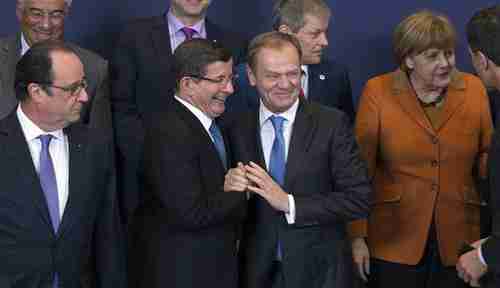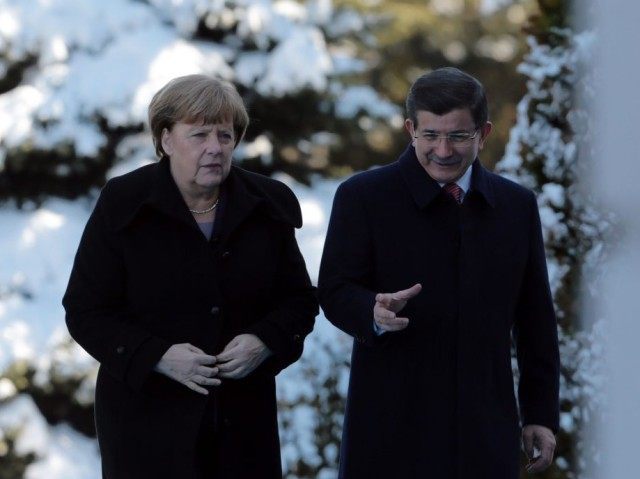This morning’s key headlines from GenerationalDynamics.com
- Bizarre EU-Turkey one-for-one refugee deal meets strong opposition
- Europe faces two additional major crises: Grexit and Brexit
Bizarre EU-Turkey one-for-one refugee deal meets strong opposition

Gleeful European and Turkish leaders at Brussels meeting (Reuters)
Leaders from the European Union and Turkey met long into the night at the Brussels summit on Monday, but failed to reach any agreement because Turkey and Hungary played hardball, as we reported yesterday.
And yet, they declared victory with a “breakthrough agreement” that would bring the “irregular flows of migrants along the Western Balkan route… to an end.”
Apparently, the person who really wanted to be able to announce this “breakthrough” was German Chancellor Angela Merkel, because she is facing three key regional elections this weekend, with polls predicting huge gains for the anti-immigrant AfD party. So she needed a victory on the migration issue. For that reason the “breakthrough” deal is only an outline, and supposedly the details will be worked out in a new Brussels summit meeting on March 17-18. If it collapses at that time, the election will be in the past.
Having a negotiating advantage, Turkey on Monday demanded 6 billion euros in aid for Syrian refugees in Turkey, visa-free travel in Europe for Turkish citizens starting in June, and a speed-up of the accession talks for Turkey to become a member of the European Union.
However, Turkey’s arch-enemy Greek Cyprus is firmly opposing the speedup of the accession talks. And several EU countries are said to oppose paying any more money to Turkey.
But the big headline-grabbing part of the breakthrough deal was the bizarre one-for-one refugee swap agreement.
Under the plan, all migrants arriving in Greece from Turkey would be be sent back to Turkey, where they would be put into a refugee camp. Then, an equal number of Syrian refugees in Turkish refugee camps would be put on a plane to be distributed to EU countries.
Last year, almost a million migrants reached the EU. So, for example, if 5,000 migrants from Turkey arrive in Greece one day, then security forces would gather them up, and force them onto boats to be sent back to Turkey. What could possibly go wrong with that?
And then 5,000 migrants from Turkey would be piled onto planes to be distributed to EU countries. But Britain will not take them. Hungary and the East European countries will not take them. Opposition has been building in Germany to admitting more migrants.
At any rate, the reason given why this is a “breakthrough” plan is that it will eliminate incentives for migrants to come to Greece by boat.
According to Iverna McGowan, Amnesty International:
EU and Turkish leaders have sunk to a new low, effectively horse trading away the rights and dignity of some of the world’s most vulnerable people.
Vincent Cochetel, United Nations Refugee Agency, says:
An agreement that would be tantamount to a blanket return of any foreigners to a third country is not consistent with European law.
This breakthrough deal was born of desperation, the fear that the EU is facing an existential crisis because there is no way to get control of the refugee crisis. Hurriyet (Ankara) and BBC and EurActiv and BBC
Europe faces two additional major crises: Grexit and Brexit
The refugee situation is not the European Union’s only existential crisis. The EU is also facing two other major crises: Grexit and Brexit.
“Grexit” refers to the proposal for Greece to exit the euro currency.
As I’ve been writing for years, the Greece financial crisis has no solution, and all the numerous bailouts have done is “kick the can down the road.” The time is now approaching for a new bailout payment crisis. Greece has to pay 3.8 billion euros in debt servicing between March and June. That money is not readily available, but the Greek government can do what it has done in the past – confiscate money from banks and take other emergency measures to meet those payments.
But there is another 2.8 billion euro payment due in July, and there is no way that the Greek government can make that payment without more bailout money. For that, it will need the next tranche of the bailout by its “troika” of lenders — IMF, European Commission, ECB. Inspectors are already returning to Greece to verify that Greece has complied with previous austerity demands required to receive the next tranche. What they are going to find is that Greece has NOT met those requirements, especially with respect to pension payments, which Greece’s government does not wish to curtail. Therefore, there is going to have to be a big negotiation with all the parties, and the IMF and Europe are feuding over who is going to bear most of the burden. That is why, once again, Grexit is on the table, and Greece may be forced to leave the euro currency and return to its historic drachma currency.
“Brexit” refers to the proposal for Britain to exit the European Union.
On Thursday, June 23, Britain will hold a referendum to decide whether Britain should remain in the European Union.
Many people are predicting that if Brexit occurs, it will be devastating for both economies, the British and European. Mark Carney, the head of the Bank of England, says that “Brexit is biggest domestic risk to financial stability” for Britain.” Others claim it will make no difference whatsoever.
People who support Brexit are usually motivated by the migrant issue, and it is not just the issue of migrants from Syria. Many Britons are equally opposed to allowing EU citizens from Poland and other eastern European countries to come to Britain.
Those who support Brexit believe that it will “solve” the migrant problem. Many of those who oppose Brexit claim that it will worsen the migrant problem, because France will no longer be obligated to slow the flow of migrants through Calais to Britain.
With these three major crises – the refugee crisis, Grexit and Brexit – we can use the “perfect storm” cliché to say that the European Union is going to have to fight hard in 2016 to stay in existence. Kathimerini and Reuters and Kathimerini and Guardian (London) and BBC and Mirror (London)
KEYS: Generational Dynamics, Turkey, Hungary, European Union, Angela Merkel, Syria, Greece, Iverna McGowan, Amnesty International, Vincent Cochetel, United Nations Refugee Agency, Grexit, Brexit, Britain, Mark Carney, Bank of England
Permanent web link to this article
Receive daily World View columns by e-mail

COMMENTS
Please let us know if you're having issues with commenting.